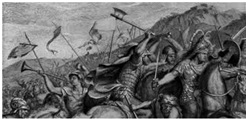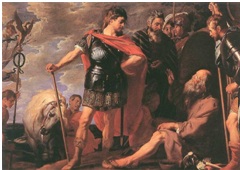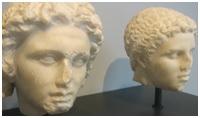|
 |
|
 |
|
|
||
Alexander the Great
Leadership
Alexander the Great (356-323 BC)
Born in Macedonia (north of Greece) and taught by Aristotle, his brilliant military victories made him the world’s most powerful man and extended his empire to Persia (now Iran and Iraq), Turkey, Egypt and northwest India. Alexander (pictured right) became King of Macedonia at the age of 20 on the death of his father, Philip.
Why was he a great leader? 1. Caring for his troops Like Napoleon (pictured right) he believed the morale of his men was most important. They were devoted to him. Marching back from India to Persia and dying from thirst, a little water was found. He refused to drink it to show everybody that his life was no more valuable than each of his men’s. He made sure that his troops were highly trained and disciplined. His cavalrymen skilfully used their knees to manoeuvre their horses, when neither stirrups nor hooves had been invented.
2. Leading by example He inspired his troops through:
3. Strategy, speed and innovation He:
He was also highly innovative -his innovations included:
4. Ruthlessness He was always frightened that the local people in his empire would rebel, and so he ruled by fear. He :
5. Learning He learned from
6. Adaptability He coped brilliantly with different political and military situations such as:
7. Image conscious He used symbolic gestures to show his intentions. Famously he untied the Gordian knot, which by legend showed he would rule all Asia. When he met Diogenes, the Greek philosopher (their meeting is pictured right), in Athens, he said to portray himself as an intellectual leader: “If I were not Alexander, then I should wish to be Diogenes”.
8. Luck He was lucky inheriting his father’s superb army and the great wealth from his gold and silver mines. One of his chief rivals, a Persian general, also died just before he became king.
9. Support and friendship He was closest to his childhood and lifelong friend, and cavalry commander, Hephaestion (pictured with Alexander on the left). Alexander valued friendship much more highly than sex!
10. Global but local He achieved world domination, but:
Key quote on leadership An army of sheep led by a lion is better than an army of lions led by a sheep.
Key quote on corporate culture Remember upon the conduct of each depends the fate of all.
Key quote on ethics and religion In faith and hope the world will disagree but all mankind’s concern is charity.
Key quotes on success I had rather excel others in the knowledge of what is excellent, than in the extent of my power and dominion. Nothing is impossible to him who will try.
|
|
|
||
|
|
||
| Copyright © wisdomtowin.com 2025 All Rights Reserved | ||
|








